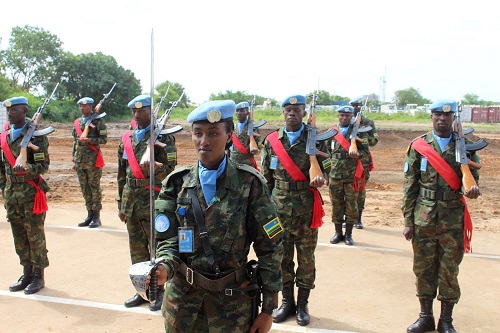By
Peter Louis
The UN Special Representation of the Secretary-General in South Sudan, David Shearer, yesterday addressed journalists in Juba about the Regional Protection Forces’ (RPF) arrival in Juba and stated that the first company of Rwandan soldiers has arrived in Juba as part of the RPF deployment. “I’m joined by Brigadier General Jean Mupenzi of Rwanda, who is the Commander of the RPF. With me too is Brigadier General Kindu Tegegn of Ethiopia, who is the UNMISS Sector-South Commander. I wanted to bring you together and provide a short update on where we are with the RPF.
A Nepalese High Readiness company and over 100 Bangladeshi engineers have arrived into the Mission area. The arrival of these contingents, as well as the Rwandan Company of peacekeepers, marks the beginning of the phased deployment of the RPF that will eventually number up to 4000 troops. The remaining Rwandan peacekeepers who are part of the main battalion will be arriving in the next few weeks –the paperwork is being processed by the South Sudan Government – and the arrival of Ethiopian troops is imminent.
I’d like to reiterate very clearly that the RPF is not a separate UN peacekeeping force like the rest of UNMISS, the 4,000 RPF peacekeepers when they finally arrive, will be ultimately under the command of the UNMISS Force Commander, Lieutenant General Frank Kamanzi. And, as the Head of UNMISS, I bear ultimate responsibility for all the peacekeeping operations in South Sudan.
The RPF troops will be based in Juba and will operate if necessary, in the surrounding areas…as per the mandate authorized by the UN Security Council. It will carry out its functions in cooperation with the government as also expressed by the Security Council resolution.
The RPF’s arrival does mean that the existing UNMISS troops already based in Juba, can, as needed, be redeployed to different locations across South Sudan – to protect civilians, support humanitarian assistance and to monitor and report on human rights abuses. UNMISS is always and consistently assessing its priorities; having additional troops means we can carry out more tasks related to our mandate, to protect civilians and support the building of a durable peace.
For example, it will enable us to put more patrols along insecure roads where there have been attacks on civilian convoys – such as on the Juba-Nimule and Juba-Bor road. On that note, I’d like to take this opportunity to offer my condolences to the family and friends of those people who were killed on the Juba-Nimule Road last week and to condemn in the strongest terms possible the attacks against innocent civilians.
All our peacekeepers strive to be robust, nimble and proactive in the duties that they carry out. But as we know fighting persists and insecurity for civilians remains a constant and real challenge. Extra peacekeepers mean we can better help protect the people of South Sudan and help build that durable peace that we are looking for.
Yes, there was never any thought of controlling the airport. The airport is the sovereign territory of the Government of South Sudan. The issue for us is, with the cooperation of the South Sudanese military and police doing joint patrols – it is something we have been talking with the authorities about and we hope will take place. There is absolutely no designs or plans of any kind to take control of the airport. Quite the opposite: the airport is the sovereign right and sovereign property of the Government of South Sudan.
We already have some patrols going up and down the Nimule road and on the Juba-Bor road. These are two vital lifelines for South Sudan. The deployment of the RPF means simply that we have additional troops at our disposal that can make more frequent patrols along that road in addition to the possibility of escorting some vehicles along the road as well. We hope that that presence will make the road safer and enable the free movement of people along that road without any problems.
The big issue that I want to make clear today is that the RPF, obviously, is going to be based in and around Juba. The freedom for other forces to be able to move out is therefore available to us and we can move to hotspots that require more in the way of protection.
First of all, UNMISS is about 12,000 troops currently in the country. That is going to be expanded with the full deployment of the RPF by an extra 4,000. There was a High Readiness Company that is here – companies are normally about 150. The bulk of the Bangladeshis are here and the RPF is here. This RPF company has to be deployed first before the remainder of the battalion could come.
Yes, there has been a delay. The deployment of any peacekeeping force requires the cooperation of both the government and obviously the Troop Contributing Countries and the work of the UN Headquarters in making sure that all the process is followed. We have liked it to have been quicker. We have been persistent with pushing the Government along with trying to overcome some of the bureaucratic hurdles that have been in our way for the last while. But we feel with the signing of an additional piece of land for some of the RPF who will be coming in and the arrival today of one of the main battalions of the RPF, that this will now move quickly. We are very hopeful that will be the case.”
Peter Louis
Peter Louis works as a freelance Videographer and Journalist in the Republic of South Sudan. He previously worked for Ebony TV, South Sudan Radio and South Sudan TV, Wau.



No Comments Yet!
You can be first to comment this post!